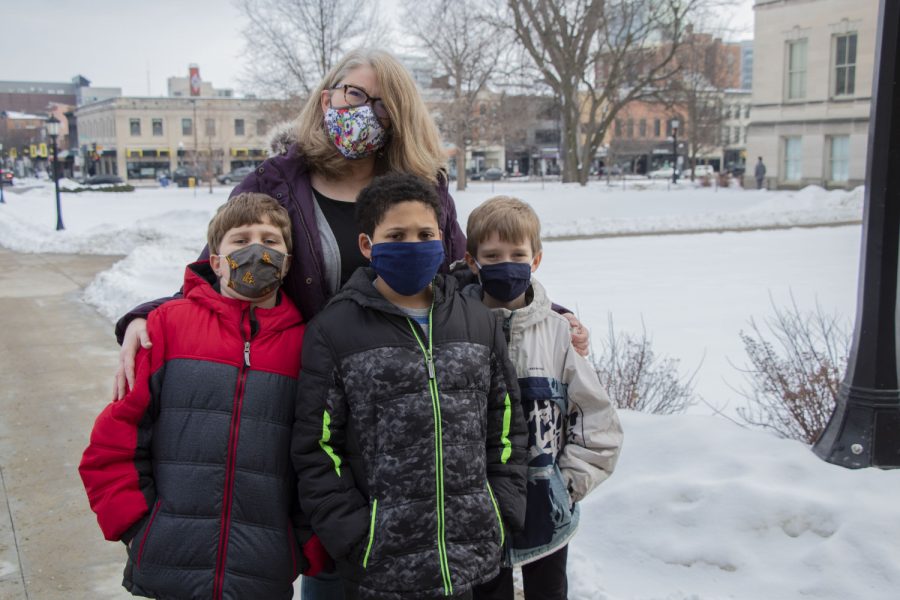Iowa City parents navigate COVID-19 conversations
Uncertain when COVID-19 mitigation measures will end, parents continue to help their children understand as emerging research reveals the pandemic’s impact on childhood mental health.
Julie Heidger and her children; Piers (left), Kaevion (middle), and Paul (right) pose for a portrait on Sunday, Jan. 24, 2021 on the Pentacrest at the University of Iowa. With no certainty when the pandemic will end, Heidger teachers her boys that their safe actions against COVID-19 can protect others.
January 25, 2021
As the country prepares for increased distribution of the COVID-19 vaccine, local parents are continuing to have conversations with their children about safety, health, and virtual schooling to unravel the pandemic’s complexity.
Julie Heidger, mother of four elementary students in the Iowa City Community School District, said she tries to encourage her children’s safety practices by telling them that they have a role in keeping their grandparents safe.
“We told them that this is a new virus that our bodies aren’t used to yet, that it affects people in different ways, and we want to keep my grandpa and step-mom safe,” Heidger said. “That’s helped my kids with the buy-in because they are our most important people.”
Iowa City parent Amy Ferguson-Miller said parenting a high-school senior and a nine-year-old elementary student has shown her the importance of communicating with her children about the pandemic in age-appropriate ways.
“With my little one, I kept it on a third-grade level so I would not overwhelm her,” Ferguson-Miller said. “For my senior, there were a lot of real-life conversations that came out of last spring. I think the shutdowns were socially harder for her.”
Ferguson-Miller said although her high school senior daughter has adapted her friendships to virtual and socially distanced settings, she is concerned that her third-grader might be losing opportunities to develop stronger friendships as a young student.
“I think when you’re little, you’re forming your friendships at that point,” Ferguson-Miller said. “And when you’re not in school, you can’t.”
According to Healthline, social-distancing measures may pose challenges for older children and younger adolescents as they reach an age associated with forming deeper friendships. Friendship-building may be harder to experience in a virtual setting or while social distancing.
In her household of four boys, Heidger said her sons find creative ways to play and have formed a closer bond during the stretch of increased social isolation.
She added that, although the pandemic’s implications can be challenging, she is glad her family is facing everything together.
Laura Fuller, a clinical psychologist and director of psychology at the University of Iowa Stead Family Children’s Hospital’s Department of Psychiatry, said she has firsthand experience witnessing the pandemic’s impact on family and childhood mental wellbeing.
Fuller said she believes, however, that there are simple ways parents can communicate with their children to ensure they remain fulfilled and safe.
“Parents should listen to their kids and listen to their concerns,” Fuller said. “They should be hearing from them what things they’re hoping to do and be adjusting with reasonable alternatives.”
Four Oaks Therapist Lydia Frazier said she has concerns about how some children and adolescents adapt to social isolation.
“Young clients that have symptoms of anxiety, social anxiety, and depression of course have worry associated with the pandemic,” Frazier said. “But the flip side is they have permission to isolate. All of their inclinations are being reinforced. I think that it’s going to be really challenging for these kids to reemerge into what we all previously saw as normal life.”
Frazier added that symptoms of mental-health disorders are rising in previously unaffected adolescents due to the pandemic.
According to a recent national survey, 14 percent of parents reported that their children’s behavioral health is worsening, and one in 10 families reported declining mental health in both parents and children since the start of COVID-19 mitigation efforts.
Some families’ reports of unstable mental wellbeing surfaced alongside changes in insurance status, loss of regular childcare, food insecurity, and job loss.
As previously reported by The Daily Iowan, some parents also find it difficult to help their children remain engaged during virtual instruction.
After student-teaching virtually in two merged sixth-grade classes last fall, substitute teacher at Shimek Elementary School Montana Staab said while her students adapted quickly, she is aware that kids and parents face challenges when taking on virtual instruction.
“I think the accountability aspect of having kids become more in charge of their learning and having parents take on more of a strategic role is definitely hard,” Staab said.
Although parents continue to worry about their children’s learning capabilities and mental health as COVID-19’s case-counts surge, Heidger said she is confident in children’s ability to adapt to mitigation efforts.
“I think there’s so much talk about how kids aren’t learning as much or that their learning is inhibited by the pandemic. I think our kids are learning life lessons,” Heidger said. “Their role of keeping people safe, and their role of being a family member — those are lessons they would not have learned otherwise.”






